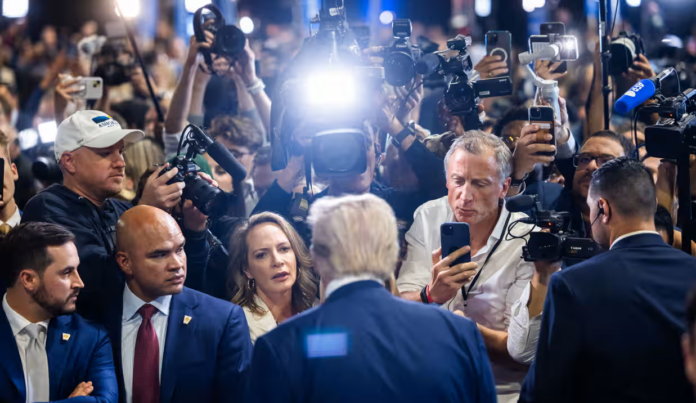Most serious news organisations are not serving the politically disengaged, yet it’s these voters who will decide the next president
With the US election upon us, we may be about to find out.
Because, more than ever before, the people who decide the election will be those who are least engaged with professional news media – the kind of researched, fact-checked content that you are likely to find in the New York Times or, for that matter, the Guardian.
Forty-three per cent of US citizens avoid the news, according to the latest Digital News Report – a worldwide survey of media use conducted by the Reuters Institute for Journalism at Oxford University.
Most of these people nevertheless encounter some news – not because of loyalty to a brand or because they actively seek out a preferred outlet, but because it comes at them, so to speak.
And what comes for free is either partisanly motivated, or funded by advertising – which means heavy with content pitched to draw eyeballs – sensationalism and clickbait.
It is the low news consumers on which the campaigning candidates are concentrating, and on which the result of the election depends.
There are significant things about news consumption that are different, this time around, from the last US election.
But before I get to how things have changed since 2020, the facts I have already given mean that all the controversies, among the politically engaged, about whether mainstream media are “sanewashing” Trump, or whether or not outlets such as the Washington Post or the Los Angeles Times publish editorial endorsements of a candidate, won’t affect the election result.
It is a debate of principal and morality, playing out among people who, overwhelmingly, have already made up their minds on how to vote. The citizens who will decide the election probably don’t even know about these controversies, and if they did they probably wouldn’t care.
The researchers at the Reuters Institute report that once disengaged from the news, people struggle to get back in, even if they want to.
Benjamin Toff, the author of a book on news avoidance, writes: “It’s like trying to tune into the fourth episode season of Game of Thrones without knowing who these people are, or what difference any of this makes. For a lot of people, that’s their feeling about the news.”
Traditionally, the journalistic mission has included making the important understandable, seeking to engage the disengaged. But while this still forms part of the rhetoric of the profession, the truth is that most serious news organisations publishing political news are not serving the politically disengaged.
Instead, with so much advertising having disappeared from media outlets to online platforms, the path to financial sustainability for serious journalism outlets lies in trying to get people who already read the news to spend more time with the outlet, and to convert them into paying subscribers.
This is essential to survival, for serious media. Yet also represents a failure of the journalistic mission.
All this challenges our conventional ideas about the connections between democracy and journalism.
It is true that democracy and journalism grew up together, and that each strengthens the other, but they are not as indivisible as the journalism profession suggests. Ancient Greece had democracy (though not for slaves) but no journalism. Al Jazeera provides journalism, but has its headquarters in non-democratic Qatar.
And, in today’s western democracies, we now have political journalism that risks no longer being mass media, but elite media.
And then on top of that, playing to the mass, we have content. All kinds of content, much of it partisan, distorted and sometimes straight-out lies.
In the last US election in 2020, we worried about misinformation and conspiracy theories spread through social media, and Facebook in particular.
Four years later, news consumption on Facebook is in decline across the world, largely because owner Meta has actively discouraged it. TikTok is on the rise as a source of news, overtaking X (formerly Twitter). Facebook and Twitter, for all their faults, did carry content from mainstream media outlets to new audiences.
But now, increasingly, it is podcasters and vodcasters and influencers who reach new audiences on social media. And they have at least some chance of reaching the disengaged and persuadable. That is why both Trump and Harris have been spending time with them.

It is fashionable to blame all our current societal ills on social media. Blocking access to social media for the young is now bipartisan – if ill-defined – policy in Australia. It is, after all, so much easier as a response to the mental health crises among the young than tackling the climate change crisis, which makes depression and anxiety almost inevitable.
Likewise, traditional news media outlets tend to blame social media for the spread of misinformation and the undermining of quality journalism.
But that is only partly right.
Surveys in Australia and the USA have shown that mainstream news media was in a crisis of trust from at least the 1970s, long before the internet, let alone Facebook and TikTok. It was therefore in rotten shape to respond to the challenges of the means of publication being in many more hands.
Meanwhile, a recent research paper published in Nature suggests, based on a survey, that fake news and misinformation is not as influential as we may think.
The survey showed that most people have low exposure to false and inflammatory content, and they tend to distrust it. However a narrow, partisan fringe seeks it out, believing content that confirms already hard-set views.
This suggests that political partisanship drives consumption of misinformation at least as much as the other way round.
There are a few bright spots in all this. The Reuters Digital News Media survey shows that countries that have strong investment in public service media – such as the public broadcasters of the BBC in Britain and the ABC in Australia – have much higher rates of engagement with news and more political engagement.
But that doesn’t apply to the USA, where public broadcasting is tiny.
Solutions? I don’t have any easy answers, and the problems are fast-moving targets. By the time of the next US election, many citizens may be consuming news written by artificial intelligence. If we are lucky, or if governments have been smart with their regulatory responses, the robots will be aggregating reliable sources.
But we have been neither smart nor lucky so far.
In the meantime, with the sands shifting beneath us, if we want voters to be well informed, we have to find a way of financially supporting and reinvigorating the journalistic mission – beyond internal chatter among an elite.
-
Margaret Simons is an award-winning freelance journalist and author. She is an honorary principal fellow of the Centre for Advancing Journalism and a member of the board of the Scott Trust, which owns Guardian Media Group
- The Guardian





